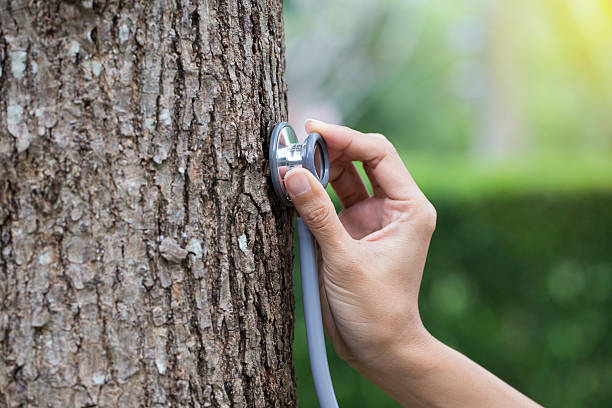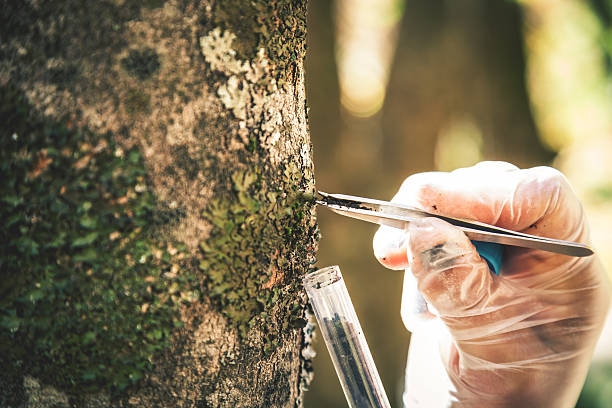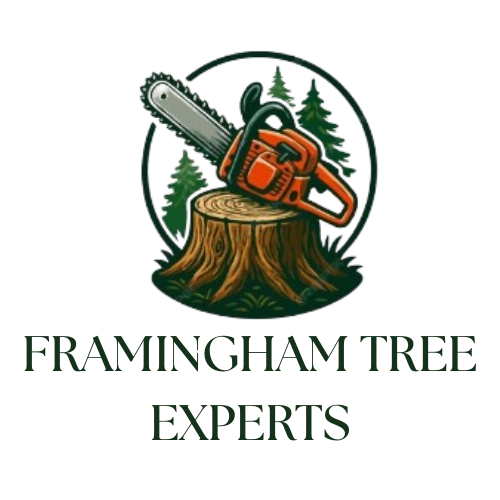Plant & Tree Health Care Services
Expert Plant & Tree Health Care in Framingham, MA
As with all forms of organic life, trees may be harmed by various factors, including disease, insects, deficiencies in nutrients, and environmental conditions. A professional diagnosis will be necessary to treat a tree that is showing signs of strain (such as yellowed leaves, brittle branches, or stunted growth). Framingham Tree Experts has certified arborists through the International Society of Arboriculture (ISA) to perform comprehensive tree health evaluations and develop individualized treatment programs to revitalize the vitality of your landscaping.
Tree health management is a distinct profession that is far greater than regular maintenance. The profession requires a high level of knowledge of tree biology, pathology, entomology, and soil chemistry in order to interpret and diagnose the causes of tree problems. Our arborists have received training to recognize and analyze the potential biological or environmental causes of the decline, rather than simply treating the obvious symptoms. We provide long-term solutions that result in long-term stability, as opposed to short-term repairs.
Trees located within the Framingham and Metrowest regions of MA face unique challenges due to the climate in this region. In many cases, the moist spring weather in this area creates favorable environments for fungi. Additionally, the wide fluctuations between temperatures during the summer months and the physical stresses of winter ice storms create extreme conditions for trees. Due to our extensive local presence, we understand the specific types of pests and diseases that thrive in this region of MA and utilize this knowledge to tailor the most effective treatments for our local environment.
Timing of action is also one of the most important elements in preserving a tree. Many of the common pests and diseases can be effectively managed at the onset of infection; however, once these pests and diseases have progressed, it can be difficult to manage them. If there are changes in the appearance or growth of your trees, it may prevent complete loss. Early evaluation by our staff may enable you to save the life of a tree, reducing the cost of removal and the overall disruption to your property.
Signs Your Trees Need Need a Doctor
Understanding what your trees are communicating to you about their health will allow you to identify whether your trees are doing well and if there is something wrong that needs a professional opinion. Your trees communicate their internal health through the different physical signals they produce. Identifying the signs of distress early on will allow you to get the right help to address problems before they cause permanent harm to your tree.
Identify Signs of Stress in Leaves
Abnormal Color Change: If the color of the leaves changes to yellow, brown, or another color other than during the fall season, it could mean your tree is having difficulty getting enough nutrients, has been damaged internally, or has a localized disease.
Early Leaf Loss: A large number of leaves dropping prematurely before the fall season usually means the tree is being subjected to extreme stress, such as excessive heat or drought, pest attacks, or poor soil quality.
Unusual Spots or Coating: Powdery white films, black soot, or circular spots on the leaves usually represent fungal or bacterial infections that have specific treatments.
Signs of Stress in the Trunk and Branches
Disruptions to Bark: Cracks in the bark, peels, or missing portions of bark usually signify structural stress or decay inside the tree, which needs to be treated by an arborist.
Cankers & Leaks: Cankers are sunken or bulging areas on the trunk that seep sap or appear discolored; both are typical of vascular diseases affecting deeper parts of the tree.
Wood-Boring Insects: Entry holes in the bark or frass (sawdust-like material) near the base of the tree signify wood-boring insects have made tunnels into the heartwood of the tree.
Indications of Stress in Roots and Soils
Exposed Roots: Exposed root systems due to erosion or over-compacted soils can contribute to long-term decline and instability in the tree.
Mushrooms/Fungi: Mushrooms or shelf fungi growing near the trunk flare are indicative of active root rot or heart rot inside the tree.
Standing Water/Drainage Issues: Standing water or saturated soil for prolonged periods can starve roots and ultimately lead to root mortality and decline of the tree.
Signs of Pests/Disease
Overcrowding of Pests: Clusters of aphids, scales, or caterpillars on the undersides of leaves or on the stems indicate a pest population that has outgrown the natural defense mechanisms of the tree.
Webs/Tents: Fine silk webs from spider mites or thicker webs from caterpillar tents are signs of pests capable of rapid defoliation of otherwise healthy canopies.
Honeydew/Sticky Substance: Honeydew is a sticky substance (usually amber-colored) on leaves or the soil surface below the tree due to sap-sucking insects, and leads to the development of unsightly black sooty mold.
General Tree Health and Stability
Limited New Growth: Little to no new leaf growth or leaves that are much smaller than in previous seasons indicate that the tree is redirecting energy to survive rather than grow.
Branch Die-Back: Progressive death of branch tips usually signifies significant environmental stress or vascular issues occurring deeper in the tree’s vascular system.
Tree Sudden Lean: A tree leaning suddenly or mounding of soil at the base of the tree is indicative of root failure or structural instability requiring immediate action.
Get A Free Quote
Disease Management And Treatment Programs
Disease treatment for fungal infections provides an approach to address the most prevalent tree health issues present in the humid climate of New England, as they relate to the development of fungal infections such as leaf spots, cankers, root rots, etc. The primary focus of our disease management program involves both a preventative treatment strategy that is designed to prevent future disease issues from developing, as well as targeted therapy to treat active disease infections. Timing of disease treatments is essential for their success, and therefore requires a thorough understanding of disease cycles and application timing.
The focus of preventative disease management is on using cultural practices and treatments to build tree resistance to common diseases prior to symptom development. Such practices include improving soil drainage to reduce water saturation; minimizing stress to trees by avoiding unnecessary pruning or other physical alterations; and preventingatively treating trees with fungicides when they are at risk of becoming infected. As a general rule, preventative management can be less costly than managing disease after it has developed and will result in better overall tree health over time.
Our systemic disease treatment options are an effective means of providing trees with internal protection against diseases and pests via either trunk injection or soil application of therapeutic compounds. The use of systemic treatments offers a long duration of protection (season-long) with low impact on the environment. The key to achieving optimal results with systemic treatments is to carefully plan the timing and dosage of each application to protect beneficial microorganisms.


Fertilization and Nutrition Programs
The process of fertilizing trees as professionals can provide needed nutrients that may be missing from the soils of urban and suburban settings; this will help with healthy tree development and provide better defense against pests and disease. All of our fertilizer programs are developed using the results from soil testing for each tree species; therefore, we ensure that each tree receives the right amount of the right nutrients in the right proportions. Healthy fertilized trees have healthier appearances and longer life spans compared to their non-fertilized counterparts.
Comprehensive soil testing and analysis will identify deficiencies of nutrients, pH imbalance, and other issues related to soil conditions affecting tree health and growth. Soil testing measures (macro)nutrients and (micro)nutrients, pH levels, organic material present within the soil, and soil compaction levels. Using this data-driven approach allows us to develop a fertilizer program that addresses actual needs and does not include generic treatment applications.
Deep root fertilization is used to deliver nutrients directly into a tree’s root zone via high-pressure injection systems that allow us to reach nutrient-deficient areas under compacted soils. The use of deep root fertilization will help increase the efficiency of nutrient uptake by the tree, while it also helps to aerate the soil and increase water penetration into the area surrounding the tree’s roots. Deep root fertilization is especially helpful when dealing with mature trees located in an urban setting where surface fertilization would be ineffective.
Pest Control And Integrated Management
Integrated pest management (IPM) is a combination of cultural, biological, and chemical methods for pest control of insects and mites, and minimizes the environmental impact of pest control on beneficial insects. The IPM approach of our company starts with identifying the pests and monitoring them in order to know at what time we need to treat the trees and which method is best to treat the pests. The scientific method of identifying pests and monitoring them helps reduce the amount of pesticides used by us, and it also provides better long-term pest control than other methods.
The identification and monitoring of insects are very important tools for detecting pest problems early, when treatment is the least expensive and requires the least amount of labor and chemicals. We monitor for common tree pests such as aphids, scale insects, spider mites, and caterpillars that can do a lot of damage to trees if not treated. By detecting pests early, we are able to target treatments that eliminate pests before they reach damaging population levels.
Biological pest control uses natural predators, parasites, and diseases to control harmful insects and maintain ecological balance. We encourage beneficial insect populations through habitat management and selective pesticide use that protects natural enemies. Biological control is a long-term solution for pest suppression and has minimal environmental impact.

